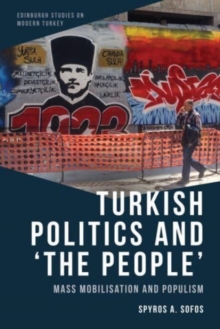
Religion, Identity and Power : Turkey and the Balkans in the Twenty-First Century Paperback / softback
by Ahmet Erdi zt rk
Part of the Edinburgh Studies on Modern Turkey series
Paperback / softback
Description
Examines the role of religion and state identity transformation in Erdogan's Turkey and its reflections to the Balkan Peninsula Discusses the effects of Turkey's authoritarian turn during the AKP rule in the domain of foreign policyExamines the role of religion, ethnicity, state identity and power in the relations between Turkey and the Balkan PeninsulaPresents the results of more than 120 semi-structured interviews with political actors, diplomats, religious leaders, scholars, journalists and religious community representatives in Turkey and the BalkansProvides an example of a hybrid insider/outsider status when conducting ethnographical fieldwork among religious groupsWatch a webinar from The Berkley Center for Religion, Peace, and World Affairs (Georgetown University) where Ahmet Erdi zt rk discusses the book with Nukhet SandalWatch Ahmet Erdi zt rk talk about his book with Prof.
Scott Lucas on DeepDivePoliticsRead an interview with Ahmet Erdi zt rk about this book at The Adriatic ReportWatch Ahmet Erdi zt rk discuss this book on the Centre for Southeast European Studies YoutubeTurkey and its recent ethno-religious transformation have had a strong impact on the state identity and country's relation to the Balkan Peninsula.
This book examines Turkey's ethno-religious activism and power-related political strategies in the Balkans between 2002 and 2020, the period under the rule of the Justice and Development Party (AKP), to determine the scopes of its activities in the region.
Ahmet Erdi zt rk illuminates an often-neglected aspect of Turkey's relations with its Balkan neighbours that emerged as a result of the much discussed 'authoritarian turn' a broader shift in Turkish domestic and foreign policy from a realist-secular to a Sunni Islamic orientation with ethno-nationalist policies.
In order to understand how these concepts have been received locally, zt rk draws on personal testimonies given by both Turkish and non-Turkish, Muslim and non-Muslim interviewees in three country cases: Republic of Bulgaria, Republic of North Macedonia and Republic of Albania.
The findings shed light on contemporary issues surrounding the continuous redefinition of Turkish secularism under the AKP rule and the emergence of a new Muslim elite in Turkey. "
Information
-
Out of Stock - We are unable to provide an estimated availability date for this product
- Format:Paperback / softback
- Pages:264 pages, 22 B/W illustrations 3 B/W tables
- Publisher:Edinburgh University Press
- Publication Date:22/06/2022
- Category:
- ISBN:9781474474696
Information
-
Out of Stock - We are unable to provide an estimated availability date for this product
- Format:Paperback / softback
- Pages:264 pages, 22 B/W illustrations 3 B/W tables
- Publisher:Edinburgh University Press
- Publication Date:22/06/2022
- Category:
- ISBN:9781474474696










